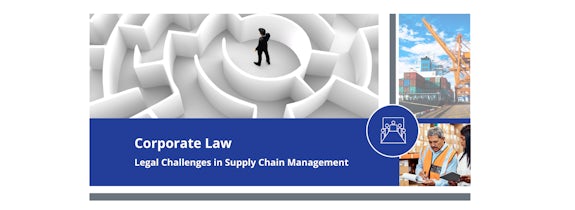Supply chain management is a complex discipline involving the orchestration of resources, information, and logistics to ensure the efficient flow of goods and services. Amidst this complexity, legal issues often arise, adding an additional layer of challenge which businesses must address. In this blog, we look at some legal challenges in supply chain management, commenting briefly on their significance and suggesting how companies might mitigate risks.
Regulatory Compliance
One of the key legal challenges in supply chain management is ensuring compliance with a myriad of local, national, and international regulations. These regulations span a wide spectrum, from environmental standards and labour laws to import/export regulations, sanctions and product safety requirements. Navigating this complex web of regulations can be daunting for businesses, and non-compliance can lead to severe penalties. Establishing a robust compliance program is essential for any company seeking to operate a global supply chain. Companies should invest in comprehensive training, monitoring, and reporting systems to ensure that their supply chain activities align with all relevant regulations.
Contractual Agreements
Supply chain management relies heavily on contracts with various stakeholders, including suppliers, distributors, and transportation providers. Contract disputes can be a significant legal challenge, particularly when interpreting terms and conditions or addressing breaches. Ambiguities in contracts can lead to costly litigation. To mitigate contractual challenges, it’s crucial to invest time and resources in drafting clear, detailed contracts. Legal counsel should be involved in the contract negotiation process to ensure that all parties’ rights and responsibilities are well-defined.
Intellectual Property Rights
Issues related to intellectual property (IP) can arise in supply chains, especially when dealing with product design, development, or technology transfers. Protecting IP rights is crucial to prevent unauthorized use or infringement by suppliers or partners. Companies should consider implementing strong IP protection measures, including patents, trademarks, and copyrights. Additionally, robust confidentiality and non-disclosure agreements can help safeguard intellectual property.
Ethical and Social Responsibility
Modern consumers and stakeholders are increasingly concerned about ethical and social responsibility in supply chains. Legal challenges can emerge if a company is implicated in unethical practices, such as child labour, human rights violations, or environmental harm. Adopting a transparent and ethical supply chain policy is essential. Regular audits and due diligence of suppliers can help identify and rectify issues. Companies should also seek to engage with suppliers who share their commitment to ethical practices.
Product Liability
Product liability is a significant legal challenge in supply chain management, particularly for manufacturers and retailers. If a product causes harm to consumers, suppliers, or other parties, legal actions can result in substantial financial losses and damage to a company’s reputation. Companies should seek to ensure rigorous quality control processes, and maintain comprehensive records of product development and testing. Adequate insurance coverage can also provide protection in case of product liability claims.
Data Privacy and Security
With the increasing digitization of supply chains, data privacy and security are emerging legal challenges. Managing sensitive customer, supplier, and operational data requires compliance with data protection regulations like GDPR (General Data Protection Regulation). Implementing robust data protection measures, including encryption, access controls, and regular security audits is critical. Ensuring that all data handling practices comply with relevant data privacy laws is also important as well as training staff on appropriate controls and legal implications of breaches.
Tariffs and Trade Policies
Global supply chains are often subject to changing trade policies and tariffs imposed by governments. These shifts can disrupt supply chain dynamics and impact costs significantly. Companies need to stay informed about trade policy changes and assess their potential impact on supply chains. Diversifying suppliers or considering localized sourcing can reduce exposure to tariff fluctuations.
In conclusion, supply chain management is not just about moving goods efficiently. It is also about managing the complex legal landscape that surrounds such operations. Companies who proactively address these legal challenges through robust compliance programs, well-crafted contracts, and ethical practices are better positioned to mitigate risks and protect their reputation. Ultimately, understanding and navigating the legal aspects of supply chain management is essential for long-term success in today’s globalized business environment.
If you would like to discuss the information outlined in this blog post, please get in touch with Findlay Anderson by email or by phone at +44 (0)7841 920 100.








